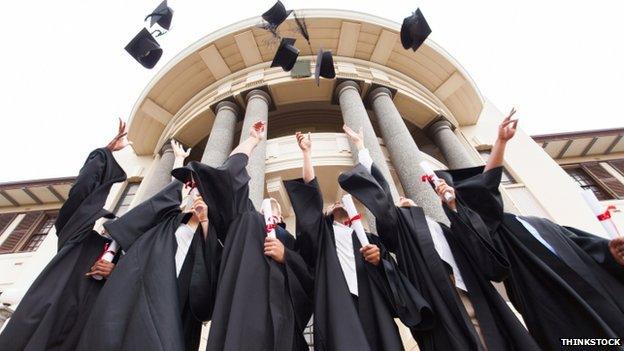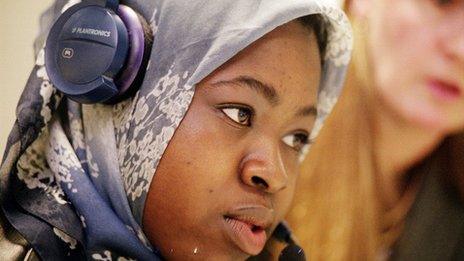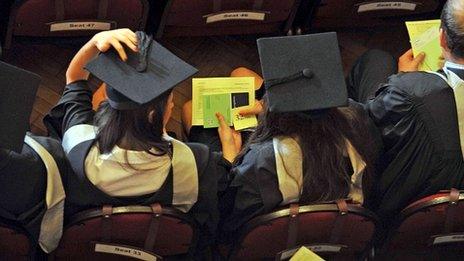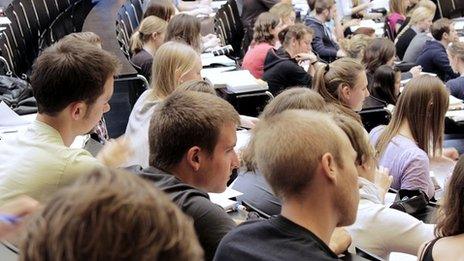University complaints by students top 20,000
- Published

The amount paid out in compensation to students has also risen to more than £2m since 2010
More than 20,000 students complained to their universities last year, a Freedom of Information request by the BBC has shown.
Responses from 120 universities across the UK revealed that total academic appeals and complaints were 10% higher in 2012-13 than in 2010-11.
Universities Minister David Willetts welcomed the finding.
He said it showed that students were demanding more for the £9,000-per-year fee.
The BBC sent Freedom of Information requests to 142 universities across the UK, asking how many complaints and appeals they had received since 2010. A total of 120 responded. The results showed universities were upholding more student complaints than ever before.
The amount paid out in compensation had also risen. The total paid since 2010 was more than £2m.
Mr Willetts said it appeared that since tuition fees rose to £9,000, students were more likely to hold their universities to account when things went wrong.
"If there are more complaints because students are more aware of what they should expect of funding and are more demanding, then I think that's a good thing," said Mr Willetts.
"When there's a fee of £9,000, the university is obliged to show what they're doing and provide a decent service."
Student consumers
The independent adjudicator for higher education, Rob Behrens, deals with university complaints which cannot be resolved internally.
He said he had also seen a rise in the smaller number of complaints which come to his office each year. In 2012, he received 2,000 complaints.
"In the last five years, we've seen a continual year-on-year increase in the numbers of complaints, often to the tune of between 20% and 25%. Very recently that has tailed off, which is encouraging," says Mr Behrens.
Raechel Mattey from the NUS says students feel they "have been lied to"
"I think the decision to raise the fees has had an impact on student thinking. Students do see themselves more as consumers than they used to. They want the best possible degree they can get."
A large proportion of the total appeals and complaints relate to cases where students appeal against their grades. But in other cases, students complain because they are unhappy with the content or structure of their courses.
The largest number of appeals and complaints in one full year was at Anglia Ruskin University, where the total in 2012-13 was 992.
Among those who have complained about the university recently were a group of law students, who have just completed a three-year law degree at the university's Chelmsford campus.
Prof Lesley Dobree says Anglia Ruskin has been generous to its students
Several of them signed up to take a Legal Practice Course in order to become trainee solicitors. But after they paid a deposit, they were told the course would not run at Chelmsford next year and they would have to travel 45 miles to Cambridge.
Online lectures
They will have two days' face-to-face teaching and will have to watch the remaining lectures online rather than attending them live.
One of the students, Rachel, said: "I was in complete shock, it was just we'd always been led to believe we could just carry on and there was never any doubt, there was never any warning that this could happen.
"I don't think it's fair - we have to pay the same in tuition fees when we're receiving less for our money."

Students have complained about a lack of face-to-face teaching
The university has rejected the students' complaint, and they are considering whether to take it further. Anglia Ruskin did not comment on the case but told the BBC it allowed larger numbers of students to appeal than some universities.
"If anything, our process has been overly generous. With a student population of more than 31,000, our numbers are not particularly surprising," said a spokesman.
The new Competition and Markets Authority is investigating whether universities are fulfilling their responsibilities under consumer protection legislation, following a report by its predecessor body, the Office of Fair Trading.
The team leader responsible for the work, Carmen Suarez, said: "We found some evidence of practices that may actually breach the consumer protection legislation. Examples include geography students that needed to complete a field trip in order to be able to graduate and were not told the cost in advance."
Find out more about this story on File on 4 on Tuesday 3 June at 20:00 BST on BBC Radio 4. Or catch up later on BBC iPlayer.
- Published3 June 2014
- Published13 June 2013

- Published14 June 2012

- Published7 July 2011
- Published21 May 2014
